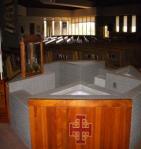 Twenty-one years ago I witnessed the baptism of my husband amidst more than two dozen baptisms of adults and children at our Parish on Easter Vigil, 1991. The celebration signified dying and rising to new life as each person climbed the stair and then descended into the huge cross-shaped baptismal font anchoring the entryway into our liturgical space; initiating them formally into our community. Water was poured from a shell three times over his head as the Trinitarian words of “in the name of the Father, the Son and the Holy Spirit” were prayed. As he emerged, I wrapped him in a white garment and accompanied him to be anointed with sacred, scented oil. Sacramental or ritual thresholds remains a foundational piece of faith journey for many communities. I’ve had the privilege of watching each of my children baptized there as well, surrounded my the community who prays for them. Sometimes called rites, these public signs witness to God‘s presence in our communities.
Twenty-one years ago I witnessed the baptism of my husband amidst more than two dozen baptisms of adults and children at our Parish on Easter Vigil, 1991. The celebration signified dying and rising to new life as each person climbed the stair and then descended into the huge cross-shaped baptismal font anchoring the entryway into our liturgical space; initiating them formally into our community. Water was poured from a shell three times over his head as the Trinitarian words of “in the name of the Father, the Son and the Holy Spirit” were prayed. As he emerged, I wrapped him in a white garment and accompanied him to be anointed with sacred, scented oil. Sacramental or ritual thresholds remains a foundational piece of faith journey for many communities. I’ve had the privilege of watching each of my children baptized there as well, surrounded my the community who prays for them. Sometimes called rites, these public signs witness to God‘s presence in our communities.  The “Ephphatha“, Aramaic for “be opened!”is another example of a rite, and one which is still celebrated during the RCIA process. In the Catholic Church, RCIA is a process whereby adults and families discern their call to formally join the community. In the 7th chapter of Mark’s Gospel we hear of a ritual encounter. Like all encounters with the living God, transformation and healing are manifested:
The “Ephphatha“, Aramaic for “be opened!”is another example of a rite, and one which is still celebrated during the RCIA process. In the Catholic Church, RCIA is a process whereby adults and families discern their call to formally join the community. In the 7th chapter of Mark’s Gospel we hear of a ritual encounter. Like all encounters with the living God, transformation and healing are manifested:
“And people brought to him a deaf man who had a speech impediment and begged him to lay his hand on him. He took him off by himself away from the crowd. He put his finger into the man’s ears and, spitting, touched his tongue; then he looked up to heaven and groaned, and said to him, “Ephphatha!”– that is, “Be opened!” — And immediately the man’s ears were opened, his speech impediment was removed, and he spoke plainly.”
The word “Ephphatha” remains in the RCIA rite when we touch the ears and the mouths of our catechumen (those desiring baptism) and candidates (those desiring Eucharist and Confirmation) that they might be open to hear God’s word and their lips may proclaim, speak and sing of that sacred word – Ephphatha – be open! When a child is baptized, an optional prayer is also a part of the Baptismal rite – a child’s ears are blessed as we pray that they be “open” to hearing God’s word, be open to God’s will, be open to God’s heart. I am grateful for these visible signs in our midst that remind of the sanctity of life and God’s continuing presence in our world. For me these are signs of hope in the midst of too much noise or too much silence.
________________________________________________________________________________
Related articles
- Openness Cures Deafness (interruptingthesilence.com)
- 23rd Sunday OTB (johnmsfs.wordpress.com)
- Ephphatha – Pentecost 15B Sermon (daringlutheran.net)
- Fourteenth Sunday after Trinity 9.9.12 Mark 7. 24-end (stephencherry1.wordpress.com)
